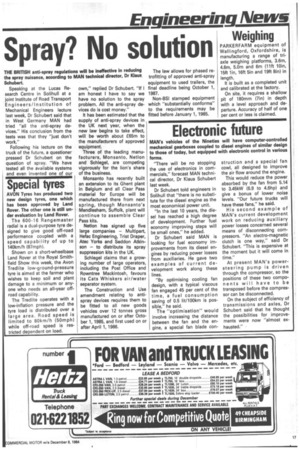Spray? No solution
Page 19

If you've noticed an error in this article please click here to report it so we can fix it.
THE BRITISH anti-spray regulations will be ineffective in reducing the spray nuisance, according to MAN technical director, Dr Klaus, Schubert.
Speaking at the Lucas Research Centre in Solihull at a joint Institute of Road Transport Engineers/Institution of Mechanical Engineers lecture last week, Dr Schubert said that in West Germany MAN had tried "all the anti-spray devices." His conclusion from the tests was that they "just don't work."
Following his lecture on the truck of the future, a questioner pressed Dr Schubert on the question of spray. "We have tested all the available systems and even invented one of our own," replied Dr Schubert. "If i am honest I have to say we have no solution to the spray problem. All the anti-spray devices do is cost money."
It has been estimated that the supply of anti-spray devices in the UK next year, when the new law begins to take effect, will be worth about £65m to the manufacturers of approved equipment.
Three of the leading manufacturers, Monsanto, NetIon and Schlegel, are competing vigorously for the lion's share of the business.
Monsanto has recently built an extension to its Ghent plant in Belgium and all Clear Pass material for Europe will be manufactured there from next spring, though Monsanto's Mendlesham, Suffolk, plant will continue to assemble Clear Pass kits.
NetIon has signed up five large companies – Multipart, Hefac Engineering, Trist Draper, Atec Yorks and Seddon Atkinson – to distribute its spray suppression kits in the UK.
Schlegel claims that a growing number of large operators, including the Post Office and Rowntree Mackintosh, favours its Cats Whiskers air/water separator system.
The Construction and Use amendment relating to antispray devices requires them to be fitted to all new goods vehicles over 12 tonnes gross manufactured on or after October 1, 1985, and first used on or after April 1,1986. The law allows for phased retrofitting of approved anti-spray equipment to used trailers, the final deadline being October 1, 1987.
Non-BSI stamped equipment which "substantially conforms" to the requirements may be fitted before January 1, 1985.




























































































